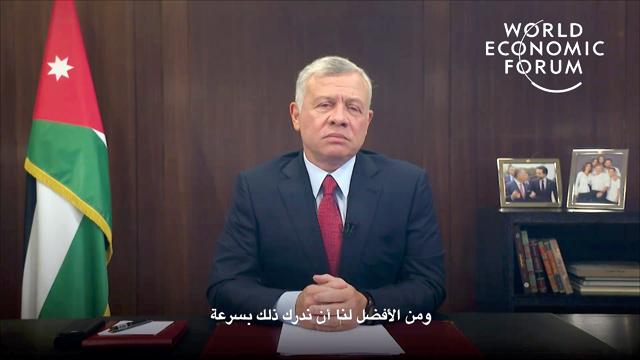- Local News
- Tue-2020-09-22 | 03:13 pm

Nayrouz News Agency :
His Majesty King Abdullah on Monday participated in the World Economic Forum’s Virtual Sustainable Development Impact Summit, held under the theme "Realising a Great Reset for Sustainable Development”.
The theme is in line with the concept of "re-globalisation”, which has been highlighted by King Abdullah, first in an opinion piece published in The Washington Post in April, according to a Royal Court statement.
His Majesty said rebuilding the international system towards a more inclusive economic recovery starts from the ground up, through mutually beneficial partnerships that form a global safety net to alleviate poverty and unemployment, bolster food security and safeguard the environment.
The King urged participants at the summit "to look at opportunities to seize, and ways to collaborate, to rebuild a truly global, inclusive system that leaves no one behind”.
Following is the full text of His Majesty’s remarks at the summit’s opening session:
"In the name of God, the Compassionate, the Merciful,
Your Excellencies,
Dear Friends:
I am delighted to help launch this much-needed discussion at such a crucial time, and I thank my dear friend Professor Schwab for his dedication to bringing about positive change in our world.
Indeed, real, sustainable development that is truly felt by all peoples has perhaps never been more needed than it is today, to help us overcome the COVID-19 crisis and its humanitarian and economic ramifications, which will continue well beyond this pandemic.
Striking all countries at an unprecedented, universal scale, this crisis should also be seen as an opportunity for all of us, if we act decisively, and act together.
We must begin by rethinking our entire global system, to become more integrated, resilient, and just. A globalised world cannot thrive by leaving its most vulnerable communities behind. We are all in this together, and the sooner we realise it, the better.
Rebuilding our international system towards a more inclusive economic recovery starts from the ground up, through mutually beneficial, bilateral, trilateral, and regional partnerships that form a global safety net to alleviate poverty and unemployment, bolster food security, and safeguard our environment.
We in Jordan have been working with our partners in the region, and beyond, to invest in the strengths and resources of each one of us, and build complementarities for the shared prosperity of our world, and the wellbeing of our peoples.
The COVID-19 crisis has led Jordan to invest in its agricultural, ICT, medical and pharmaceutical capabilities, in partnership with the private sector, to help ourselves and others. And we are ready to build on this potential, to become a launch-pad and a regional hub that facilitates international and regional efforts to respond to the challenges ahead.
My friends,
This pandemic and its long-term consequences have exacerbated the longstanding crises in our world. The climate crisis, poverty, hunger, unemployment, and social and economic inequalities have worsened after years of ineffective collective action.
The way forward must be rooted in a re-globalisation that fortifies the building blocks of our international community, by enabling our countries to strike a balance between self-reliance and positive interdependence, enabling us all to jointly mount a holistic response to all crises facing our world — a response that strengthens our global economy, but also addresses inequalities; a response that leads to technological and industrial progress, but also ensures the sustainability of our shared environment.
So in your discussions today and in the days ahead, instead of looking at problems to solve, I urge you to look at opportunities to seize, and ways to collaborate, to rebuild a truly global, inclusive system that leaves no one behind.
I wish you a fruitful summit.
Thank you.”
The summit is being held on the sidelines of the 75th General Assembly of the United Nations, with the participation of heads of state and around 2,500 business and political leaders, representatives of civil society and international organisations, media professionals, and academics.









